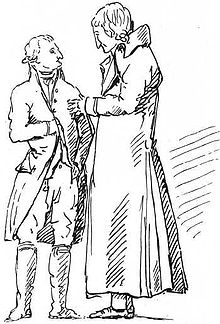Literature year 1795
1791 | Literature year 1795 | 1797 | ►►
Overview of the literary years
Further events
| Literature year 1795 | |
|---|---|
|
With the collaboration between Goethe and Schiller, the literary epoch of the Weimar Classics began .
|
Events
From 1795 Goethe and Schiller worked closely together. This creative period of 10 years was later - in the narrower sense - also referred to as " Weimar Classic ".
M me de Staël , who in 1792 had withdrawn to her country estate in Coppet on Lake Geneva for political reasons , is returning to Paris to reopen her salon for a short time . Guests of your salon are u. a. the physician and philosopher Pierre-Jean-Georges Cabanis , the playwright Marie-Joseph Chénier , the poet Benjamin Constant , the historian Pierre-Claude Daunou , the politician and philosopher Dominique Joseph Garat and the politician and publicist Pierre-Louis Roederer . Just two years later, she was forced to return to Coppet - she and her salon are suspected of being in the Directoire .
New releases
Periodicals
- Friedrich von Gentz founds the New German Monthly . In addition to political and financial issues, the magazine's topics include classical literature and education and, above all, contemporary history: the course of the French Revolution, the constitution of the Directoire in France and fundamental problems of democracy and participation. The magazine ceases to appear after only three volumes.
- Die Horen , a monthly magazine edited by Friedrich Schiller, is published by Cotta Verlag in Tübingen. In addition to Schiller and Goethe u. a. Johann Gottfried Herder , August Wilhelm Schlegel and occasionally Karl Theodor von Dalberg , Friedrich Heinrich Jacobi , Johann Heinrich Voß , Sophie Mereau , Gottlieb Konrad Pfeffel or Cornelia Schlosser . The magazine ceased to appear in 1797.
- " Eudämonia or Deutsches Volksglück , A Journal for Friends of Truth and Law", was a reactionary-conservative magazine that was founded in 1795 and lasted until 1798.
prose
- Hesperus or 45 Hundposttage , a novel by Jean Paul , appears in the Matzdorff bookstore in Berlin.
- Conversations of German emigrants , novellas by Johann Wolfgang Goethe, are printed for the first time in volumes 1–4 of Schiller's magazine “Die Horen”.
- Goethe's Wilhelm Meister years of apprenticeship is published by Verlag Johann Friedrich Unger , Berlin, in two sections from 1795 to 1796.
- Ludwig Tiecks letter novel The story of Mr. William Lovell appears from 1795/96 in the Nicolaische Verlagsbuchhandlung , Leipzig and Berlin.
- The poetry story Chess Lolo and the novel Legacy of Diogenes von Sinope. Thoughts on an old inscription by Christoph Martin Wieland appear as the final edition.
Poetry
- Proximity of the Beloved , a poem by Johann Wolfgang Goethe, is printed in Schiller's Almanac of the Muses for the year 1796.
- The “Weimar Song Book”, a collection of 595 songs edited by Johann Gottfried Herder, is published in the Hoffmannische Hofbuchhandlung in Weimar.
- Herder's "Terpsichore", a collection of poems and short prose pieces, was published in 3 volumes by Bohn in Lübeck in 1795/96.
Non-fiction
- In the "Horen", Schiller publishes his two literary theoretical writings on the aesthetic education of man in a series of letters (1795) and on naive and sentimental poets (1795/96).
- "Basis of the entire science as a handwriting for his audience" (1794/95), systematic main work of the philosopher Johann Gottlieb Fichte and one of the central works in post-Kantian idealism .
- Kant's " To Eternal Peace . A Philosophical Draft." The first version is published in 1795 by the Friedrich Nicolovius publishing house in Königsberg. A second expanded edition follows a year later, also by Nicolovius.
- Johann Gottlieb Fichte: "On the ability to speak and the origin of language."
- The fourteen-volume complete edition of the works of Helvetius is published by Didot in Paris .
Born
- January 9 : Heinrich Wilhelm Hahn the Younger , bookseller, publisher and editor of the Monumenta Germaniae Historica († 1873 )
- January 15 : Willem de Clercq , Dutch writer († 1844 )
- February 8 : Moritz Saphir , Austrian writer († 1858 )
- July 2 : Karl Gustav Nieritz , German folk and youth writer († 1876 )
- July 21 : Friedrich von Waldersee , Prussian lieutenant general and military writer († 1864 )
- August 3 : Anne Bignan , French writer and Homer translator († 1861 )
- August 7 : Joseph Rodman Drake , American poet († 1820 )
- September 29 : Kondrati Rylejew , Russian poet († 1826 )
- October 5 : Karl Ludwig Sand , fraternity member, murderer of August von Kotzebue († 1820 )
- October 17 : Johann Christoph Biernatzki , writer († 1840 )
- October 31 : John Keats , British poet († 1821 )
- Birthday unknown
- Abdullah bin Abdul Kadir Malay scholar and writer, († 1852 ). His autobiography is considered an important historical source.
Died
- February 11 : Carl Michael Bellmann , Swedish song writer (* 1740 )
- April 12 : Johann Kaspar Steube , German shoemaker, soldier, language teacher and writer (* 1747 )
- April 24th : Christian Friedrich Voss , German publisher, who u. a. Works by Gotthold Ephraim Lessing, Friedrich II., Johann Gottfried Herder and Jean Paul published (* 1724 )
- May 19 : James Boswell , Scottish writer, lawyer and biographer of Dr. Johnson (* 1740 )
- June 29th : Ernst Daniel Adami , German Kapellmeister, organist, music teacher, writer, choir director, teacher and theologian (* 1716 )
- Date of death unknown
- July: Ranieri de 'Calzabigi , Italian poet, librettist Christoph Willibald Glucks (* 1714 )
literature
- Theodore Ziolkowski : The miracle year in Jena: Spirit and society 1794/95. Stuttgart 1998, ISBN 3-608-919-422 .

